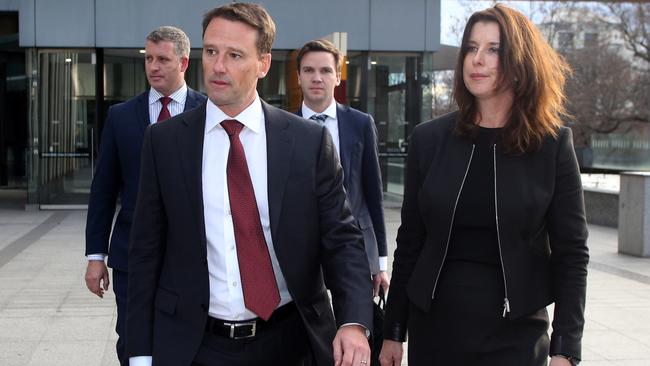Banking royal commission: super rip-offs, gouging revealed
Australians are being ripped off by fund trustees “surrounded by temptation” to do wrong with the $2.6 trillion savings pile.

Australians are being ripped off by super fund trustees “surrounded by temptation” to do the wrong thing with the $2.6 trillion retirement savings pile, while regulators are failing to search out and punish bad behaviour, the banks royal commission has heard.
In one example of fee gouging outlined at the royal commission yesterday, NAB charged a customer of its MLC division an array of fees that gobbled up $892.20 of $1101.95 earned from a year-long investment in the simplest option available, cash.
As the commission investigates the inner workings of the compulsory superannuation system over the next two weeks of hearings, it will explore how retirement savers are swindled through fees for services they never receive, cosy deals between retail super funds and the banks that control them, account-draining insurance premiums, and payment of commissions — even though new kickbacks were banned in 2013. Counsel assisting the commission Michael Hodge QC launched an attack on the sector’s twin regulators, the Australian Securities & Investments Commission and the Australian Prudential Regulation Authority, saying there was “no dedicated and active conduct regulator shining a spotlight on the trustees and searching out bad behaviour”.
An “unfortunate illustration” of the confusion between the regulators was that each gave a different answer last Friday in response to the commission’s questions about progress on a co-operation agreement between them, Mr Hodge said.
He said APRA had the power to ban people from being superannuation trustees, but had done so just once since 2008, when a change in the law required it to go to court to do so.
Mr Hodge said trustees were “surrounded by temptation”, including choosing profit over the interests of members, or they set up structures that distanced themselves from responsibility and “thereby relieve the trustee of visibility of anything that might be troubling”, he said.
“What happens when we leave these trustees alone in the dark with our money?” he said. “Can they be trusted to do the right thing?”
The comments come after The Australian has exposed a systemic pattern of fee gouging from super savings in a series of articles.
NAB has already refunded $35 million to more than 220,000 people charged a fee who got nothing for it because they did not have a financial planner. It plans to spend an additional $87m compensating 205,000 super members because it failed to tell them clearly they were able to opt out of paying the impost.
Mr Hodge said the inquiry’s behind-the-scenes work had established there was less misconduct in the not-for-profit industry sector, where super funds were controlled by unions and employer bodies, than in the retail sector, where funds were run to profit the banks and other financial institutions that controlled them.
Mr Hodge said the commission had dropped the idea of putting executives from $46bn construction industry fund Cbus in the witness stand — but said it would investigate spending by industry funds on two ventures — news website The New Daily and a TV commercial comparing banks to foxes in the superannuation henhouse — to see if this was in the interests of members.
Ian Silk, the chief executive of the nation’s biggest fund, the $130bn Australian Super, is expected to give evidence on the issue today.
NAB executive Paul Carter, a former manager of the bank’s super business, yesterday spent four hours in the witness stand as part of a detailed examination of fees and commissions charged to by the bank’s MLC division.
He was shown an account statement for an MLC super fund member who had invested $43,000 in cash, and received a return of just 1.2 per cent a year.
Among the $892.20 in fees MLC collected in 2015 was an administration fee of $554.32, an adviser contribution fee of $91.67, a plan service fee of $186.47 and “Stronger Super Implementation Fees” of $65 — the last to cover MLC’s costs in bringing in a package of government reforms designed to make the superannuation industry more efficient.
Under questioning from Mr Hodge, Mr Carter struggled to identify what benefits clients got from the plan service fee, which entitled them to ask for general advice from a financial planner.
“Fees for no service” have already emerged as a key theme of the commission.
AMP’s dishonesty with ASIC over the issue claimed the scalp of chairwoman Catherine Brenner after it was exposed at hearings earlier this year.
AMP, which saw its share price smashed by the dramatic revelations, is to return to the commission hot seat during this round, alongside other retail heavyweights including ANZ and IOOF.
Industry funds including Energy Super and Hostplus are also to be questioned. Representatives of APRA and ASIC are also expected to be grilled.







To join the conversation, please log in. Don't have an account? Register
Join the conversation, you are commenting as Logout